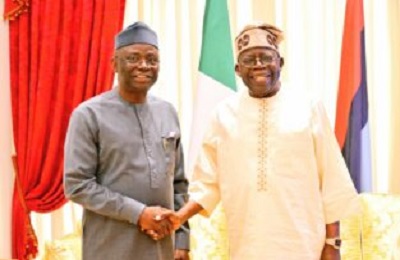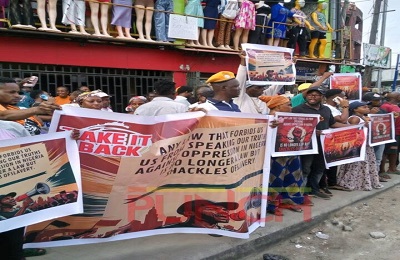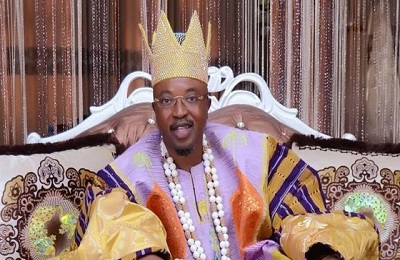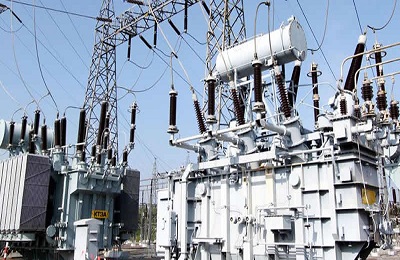LAGOS – In a surprising turn of events that has caught political watchers off guard, Pastor Tunde Bakare walked into President Bola Tinubu’s Lagos residence on Wednesday for what would become one of the most significant political conversations of the year.
The Bakare Tinubu meeting wasn’t just another courtesy visit. Just months ago, these two men were locked in a war of words that had the Senate calling for Bakare’s head. Now, they sat face-to-face, discussing Nigeria’s future like old allies rather than bitter rivals.
Presidential aide Bayo Onanuga confirmed the meeting on X, but the real story unfolded when Bakare stepped out to speak with waiting journalists, his tone notably different from the fiery criticism he had hurled at the president earlier this year.
“It’s About How the Country Will Go Well”
Gone was the fire-and-brimstone preacher who had accused Tinubu of running a “motor park brand of politics.” In its place stood a statesman focused on solutions.
“It’s not about just reservations. It’s about how the country will go well,” Bakare told reporters, his words carrying the weight of someone who had moved past personal grievances to bigger concerns.
The pastor’s vision remains unchanged: “My personal vision is to see a nation that works in my lifetime.” But his approach has shifted dramatically. When you discuss with the person in charge, he explained, “you leave it with him to do whatsoever he wills with what you have suggested.”
This wasn’t the Bakare who had publicly dressed down Nigeria’s leadership. This was a man choosing influence over confrontation.
The Dream of a United Nigeria
Bakare painted a picture of the Nigeria he wants to see – one that would make any patriot’s heart swell with hope. “I’d like to see Nigerians being their brother’s keeper,” he said, his voice carrying genuine emotion.
His vision extends beyond mere wishful thinking. “I like to see good collaboration between the best of the north and the best of the south to steer Nigeria in the right direction.” It’s a dream that resonates with millions of Nigerians tired of regional politics and ethnic divisions.
But Bakare didn’t shy away from hard truths. The country has been stuck in neutral for too long, he argued. “We have danced around some subjects for too long a time; it’s time to take concrete action to ensure that the mercies of our country do not live in abject poverty.”
Anyone who has watched fuel queues stretch for miles or seen families skip meals because of soaring food prices knows exactly what he means.
From Fire to Fellowship: The Easter Controversy
To understand why this meeting matters, you need to rewind to April 2025. Bakare had delivered an Easter broadcast that sent shockwaves through Abuja’s corridors of power.
The usually measured pastor had unleashed a verbal assault on Tinubu’s administration, accusing the president of turning the National Assembly into “a haven for legislative rascality.” He called lawmakers the “48th member” of Tinubu’s cabinet – a cutting reference to their perceived lack of independence.
The Senate didn’t take it lightly. Senator Yemi Adaramodu, speaking for his colleagues, warned that Bakare had “crossed the line.” The political temperature had risen to dangerous levels.
Yet here they were, months later, sitting together and discussing Nigeria’s future. Politics, it turns out, really does make strange bedfellows.
When Rivals Become Allies
The irony wasn’t lost on political observers. These two men had squared off for the APC presidential ticket in 2022, with Bakare positioning himself as the alternative to Tinubu’s brand of politics.
Bakare’s Easter criticism had struck at the heart of Nigerians’ pain – fuel subsidy removal, naira devaluation, and inflation that pushed citizens “to the brink.” His words had resonated because they reflected what ordinary Nigerians felt every day.
But sometimes, critics can become the most effective advisors. Bakare seems to have realized that shouting from the sidelines, while satisfying, might not be the best way to create the change he desperately wants to see.
What This Means for Nigeria
The Tinubu Bakare reconciliation sends ripples far beyond Lagos. It suggests that Nigeria’s democracy might be maturing in ways that aren’t immediately obvious.
Think about it: when was the last time you saw a sitting president sit down with someone who had publicly criticized him so harshly? When did you last see a critic choose dialogue over continued attacks?
This meeting could signal several important shifts:
A New Approach to Governance: Tinubu’s willingness to engage with critics suggests confidence and, perhaps, wisdom. Strong leaders often surround themselves with people who challenge their thinking.
Pragmatic Opposition: Bakare’s choice to engage rather than remain on the attack shows a mature understanding of how change actually happens – through influence, not just criticism.
Hope for National Dialogue: If these two can find common ground, perhaps there’s hope for bridging other divides that have long plagued Nigerian politics.
The Real Test Ahead
Of course, meetings are easy. Implementation is hard. The true measure of this reconciliation won’t be found in press statements or photo opportunities. It will be in policy changes, improved governance, and concrete improvements in the lives of ordinary Nigerians.
Both men understand this. Bakare’s emphasis on seeing “a nation that works” isn’t just rhetoric – it’s a challenge. Can their combined influence, experience, and networks actually make Nigeria work better for its 200 million citizens?
The challenges are real: security concerns across multiple regions, an economy still recovering from various shocks, and a citizenry that has grown weary of promises without performance.
A Lesson in Political Maturity
Perhaps the most encouraging aspect of this story isn’t the meeting itself, but what it represents about Nigerian political culture. Democracy works best when there’s room for both criticism and cooperation, when leaders can disagree strongly without becoming permanent enemies.
Bakare and Tinubu have shown that it’s possible to move from conflict to collaboration without either side losing face. The pastor hasn’t abandoned his principles, and the president hasn’t silenced a critic. Instead, they’ve found a way to channel their shared love for Nigeria into something potentially productive.
Looking Ahead
As Nigerians watch this political reconciliation unfold, many are asking the same question: will this translate into tangible improvements in their daily lives?
The answer will determine whether this meeting becomes a footnote in political history or the beginning of a new chapter in Nigerian governance. For now, it represents something increasingly rare in politics anywhere: the possibility that sworn enemies can become unlikely allies in service of a greater good.
The cynics will say it’s all politics as usual. But sometimes, politics as usual evolves into something better. And sometimes, that evolution starts with two former rivals sitting down to talk about the country they both love.
By Abdullah Korede








